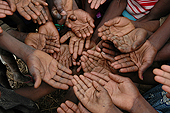|
||||||||||||||
| Developing
nations including political aspects Developing nations and climate change are connected in a variety of special ways. Some critics point at developing nations as the new causes of climate change, others see them as those most likely to suffer from the impact. Whilst either point may have some truth, the situation is complex and varies from nation to nation. The summary from the Stern Review states: “All countries will be affected. The most vulnerable – the poorest countries and populations – will suffer earliest and most, even though they have contributed least to the causes of climate change. The costs of extreme weather, including floods, droughts and storms, are already rising, including for rich countries.”  Geographers
might better consider terms like “Less developed
country (LDC)” or “Less economically
developed country (LEDC)” though this raises issues about nations
which are actually regressing in economic terms and is an inadequate description
for some industrialising nations. There have been many efforts to quantify
nations in terms of developments including in this context, energy consumption
or production. One important measure is the Human
Development Index (HDI) which has been used by the United Nations,
though some would argue this focuses too much on individual welfare rather
than economic development or success measured by GDP
alone. Despite the points above, the UN Human Development Report 2006 provides
an excellent source of data on an annual basis and includes access to tools,
much data and other materials of use to geographers. Geographers
might better consider terms like “Less developed
country (LDC)” or “Less economically
developed country (LEDC)” though this raises issues about nations
which are actually regressing in economic terms and is an inadequate description
for some industrialising nations. There have been many efforts to quantify
nations in terms of developments including in this context, energy consumption
or production. One important measure is the Human
Development Index (HDI) which has been used by the United Nations,
though some would argue this focuses too much on individual welfare rather
than economic development or success measured by GDP
alone. Despite the points above, the UN Human Development Report 2006 provides
an excellent source of data on an annual basis and includes access to tools,
much data and other materials of use to geographers.Clearly the development of a nation is integrally bound with political change indeed, “the politics of developing nations” has become a key course title for academic study. As with the impact of climate change itself, this is an area which varies with individual nations, reflecting past history, military capability, regional links as well as climate, natural resources, population etc. Whilst government may seem quite different across Brazil, India and South Africa for example, in the context of globalisation they have a common cause in fighting the “protectionist” trading of the developed nations. China again though radically different in its governance is a major supporter of African developing nations. It is useful to remind ourselves that the number of democracies has more than doubled since the mid 1970’s and that it was not that long ago that some countries in Europe were dictatorships. In the West we tend to be familiar with the G8, but developing nations are forming alternative coalitions and there is growing activity driven particularly by Brazil, Russia, India and China (BRIC) along with South Africa and through groups like G20, G20+. The BRICs are expected to be dominant economies by 2050 but with their large populations and land areas may suffer more than other nations if they do not manage the effects of climate change alongside their political, economic and social development. Since significant effects (flooding, desertification and drought) in many LDC areas are now unavoidable, nations need to adapt rapidly; requiring effective government intervention which different types of government will find more or less manageable. There are financial, political and institutional barriers to encouraging clean energy in developing countries and economies in transition (Stern Review Ch 23) |
||||||